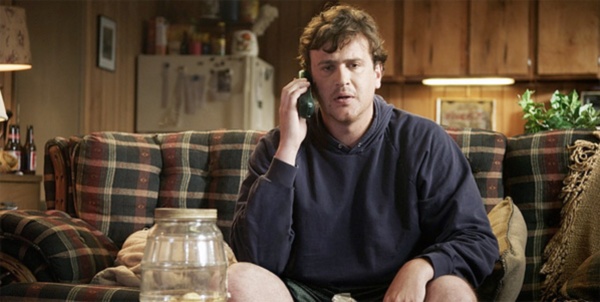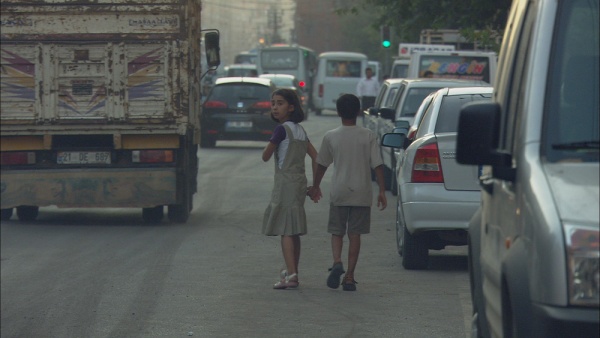2011 // USA // Kurt Kuenne // November 20, 2011 // Theatrical Blu-ray (Landmark Tivoli Theater)
The core narrative conceit of Shuffle is inventive, but nonetheless disposed to invite comparisons to other works: Quantum Leap, Jacob’s Ladder, Dark City, A Christmas Carol, Twelve Monkeys, Memento, and, most crucially, It’s a Wonderful Life. The film’s aesthetic and tone, meanwhile, are presented with an affectionate nod to the original Twilight Zone series. Writer, composer, and director Kurt Kuenne has submitted, for the viewer’s approval, one Lovell Milo (T.J. Thyne), a man who is living his life out of sequence. Each morning he awakens to a day plucked seemingly randomly from the catalog of his experiences. These days gradually reveal a life riddled with dissatisfaction and heartbreak, from his stymied ambitions to become an art photographer to his tragic romance with the girl next door, Grace (the marvelously pixie-voiced Paula Rhodes). The vaguely amnesiac Lovell cannot recall exactly when this temporal scrambling first began, although (with a little prodding) he eventually begins paying close attention to everything he sees and hears, in the hopes of unraveling his private, jumbled Hell. Gradually, patterns begin to emerge within the chronological chaos, as clusters of significant event appear around particular ages (8, 26, and 30) and the pivotal role of Lovell’s domineering father (Chris Stone) becomes increasingly clear.
Shuffle’s narrative gimmickry and deep pedigree in genre filmmaking would seem to place it far afield from Kuenne’s previous feature-length effort, the raw and unnervingly personal documentary Dear Zachary: A Letter to a Son About His Father. Both films, however, advocate acceptance and fortitude in the face of the cosmos’ fundamental unfairness, and both lionize the principle that the Greek philosophers termed eudaemonia, a balanced existence of virtue and happiness. Shuffle’s novel structure and recurring playing card motif both underline the entangled character of chance and control in the human experience. The film poses that, like a game of poker, life's outcomes are partly out of our hands and partly dependent on our choices. However, the simple-mindedness of the underlying story and the abundant heart-tugging melodrama suggest that the film doesn’t have particularly cerebral ambitions. Shuffle’s affinity for gooey sentimentality often grows grating, appearing as it does without Capra’s often-overlooked dark edge. Similarly, the film’s reliance on theistic mumbo-jumbo for its twists lends a hollow, desperate note to what is otherwise an earnest tale of personal liberation.










